You’ve likely been in a situation where the company you work for has a core value mission statement displayed proudly on the website. However, in day-to-day working life, the employees don’t truly understand, care or even feel connected to these core principles.
Alternatively, you may have worked for a business that has no idea where its company core values lie. You’ll likely have found that defining goals difficult, with employee engagement low on the agenda.
The cold hard fact is that defining a core value proposition is not easy. Company culture needs to be fluid, evolving or pivoting as things grow and change both internally and externally.
It begs the question, is defining and developing strong company values worth your time? In a word, the answer is yes.
The benefits of strong, well-defined company core values
There are numerous benefits to implementing a well-defined set of guiding principles for your business. The effects can be seen across the workforce, for management, your business growth and profits. If you’re invested in improving any of these factors, a corporate values overhaul could be key to progression in several areas.
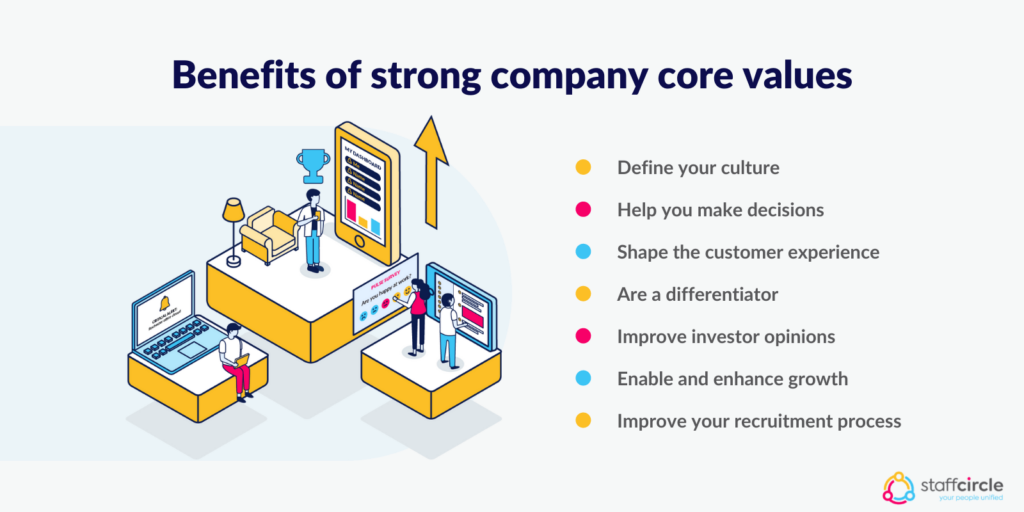
We’ve outlined the main seven benefits below:
Core values define your culture
Establishing company culture is a high priority for most HR professionals. Strong corporate culture is coveted but hard to create, instil and improve. Aligning your team through core values, however, creates a foundation from which a successful, productive and positive culture can grow.
They help you make decisions
When tough decisions are needed, it can be helpful to refer back to your organisation’s core value statement. Does the matter in question fit within our core values? If yes, move forward. If no, pass. This can be applied by employees at all levels, from your CEO to new hires.
Your core principles shape the customer experience
Your relationship with your customers or clients is a key factor when deciding core values. Aligning every person on your team towards a customer-first mission statement, such as ‘going the extra mile’, ‘enabling customer success’ or ‘working with integrity’ will develop a better experience throughout the entire customer journey.
Company core values are a differentiator
Companies use their core values to express to the world, and potential customers, how they are different. Use your corporate values as a USP. Your unique value proposition in a competitive marketplace may come down to a competitive advantage that only your specific values can offer.
Investors see core values as a marker of a strong company
If attracting venture capitalists is on your agenda, it’s a good idea to include your core value statement in your pitch deck. Investor relations can be boosted by the presence of strong company culture as it demonstrates cohesiveness and alignment.
A strong company culture improves your recruitment process
The job market is highly competitive right now, with remote work reducing location bias and enabling more people than ever to compete for sought-after roles. Job seekers have more choices and search for more than just a paycheck, so employee recognition of strong core values can create an important recruiting advantage for your business.
Well-defined company values enable and enhance growth
When your internal workforce is aligned, engaged and empowered collectively toward a shared set of core values, their productivity is inevitably optimised. Great news for your bottom line!
Can company core values help make better business decisions?
Your company’s core values can act as a foundation for business decision-making. At its most basic level, company values are a reflection of what your business stands for and what it is committed to. They can be used to make better business decisions in several ways.
They are the guiding principles that dictate how your business and every employee behaves. A defined company culture provides a framework for making decisions, both big and small. The best company values are those that are meaningful and relevant to the company and its employees. They should also be reflected in company policies and practices.
When company values are used to make business choices, it helps to ensure that the decision is aligned with the company’s mission and goals. Making decisions based on a defined set of business goals ensures that it is made in the best interest of the company and each employee.
Examples of companies with strong core values
In his famous TEDx Talk, business leader Simon Sinek talks about the importance of knowing your “why.”
Developing a core values statement and reinforcing that set of values with your workforce can help keep your business stay in touch with your “why.”
FastCompany lists the example of the Harley Davidson brand as a business with well-defined company values. Its core values are what keep it from being driven out of business by other motorcycle manufacturers that are constantly nipping at their heels. They aren’t selling the best motorcycle in the world, the best customer service or even the cheapest vehicles. Instead, Harley Davidson sells a set of values – freedom, Americana and the experience of the open road.
For an in-depth view of some strong core company values in action, take a look at the in-depth review carried out by OnStrategy. They highlighted four companies with distinctive values that are well-known; Kinko’s, Seventh Generation, Patagonia and Starbucks. The article explores the importance of defining an organisation’s identity and how it affects the business.
Proof that focusing on company values delivers results
Ajay Pattani is an Entrepreneurs’ Organization (EO) member from Chicago and the founder of Perfect Search Media. Considering his business core values are among the company’s most important assets, his insight is an amazing tool to consult. It is, after all, straight from the horse’s mouth as someone who has successfully branded and marketed their own company.
He says it’s not only important to interview and find the right people, but that you mark out what makes your company different from others in the field. Before you know this, you must find the values that make your company different and personal.
Pattani cites the process and the changing of values as two major milestones. Not rushing the creation of core values is essential and evolving past those that don’t work/are not authentic is just as important to running a successful business.
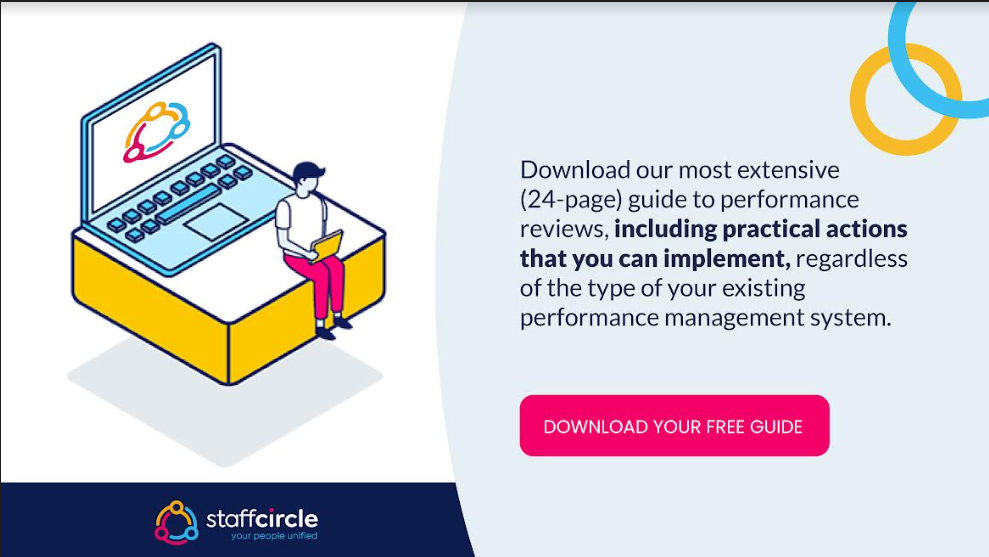
How to define company core values
We’re going to walk you through how you go about the process – from the recognition of need to planning and the creation and testing of the values you decide upon. Let’s get started.
Planning your core values decision process
For small startups and fairly new businesses, the exercise of building brand values will be carried out by a very small number of people: the founder and the supporting leadership team (which may be no more than 2-3 people).
If your business is new and small, you can determine your core values purely by what looks good for the business, what will appeal to potential customers and employees and what will drive success. There’s no history to consider. No reputation to factor in. Relative to a large, established business, it’s a simple process.
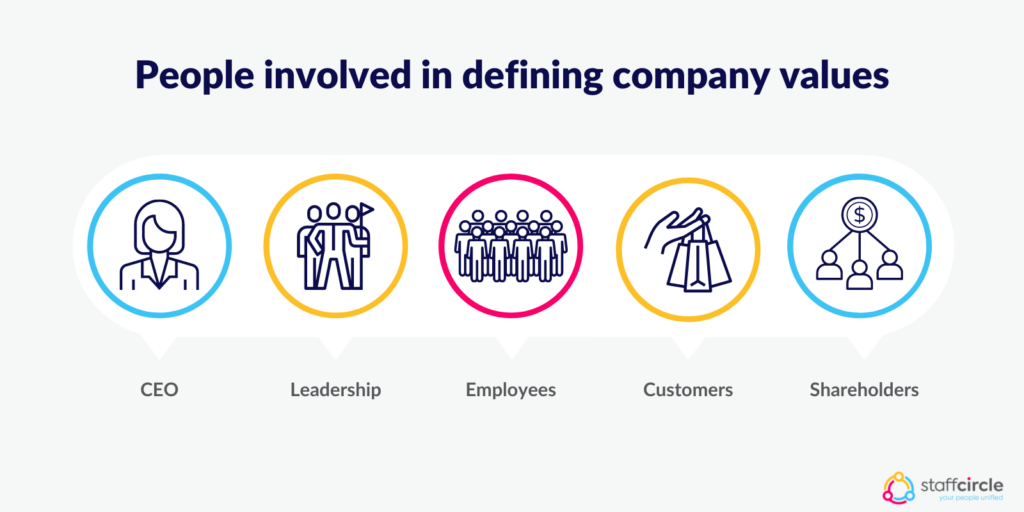
But if you’re not a new or small business, and you have several established employees, defining your company’s core values is going to be a bit more complicated. Yes, your CEO and leadership team will still spearhead the process, but you’ll also need to consider involving employees, customers, and even perhaps shareholders.
It’s not going to be a quick turnaround, either way. So, it’s important to set out a clear timeframe for the project. Plan the different milestones, line up customers for interviews and devise a plan for getting input from your employees.
From a customer service point of view, it’s fine to only approach happy customers – in fact, that’s recommended. Why? Because you want your core values to reflect the positive attributes of your company from a customer’s eyes. Where better to look?
Gathering employees’ perspectives in an unbiased and organised manner can be more of a challenge. It’s vital that you ask a broad selection of your staff to have input, including one team member from each department and level at the minimum. This will give you the widest possible pool of answers. Deciphering the results and getting valuable insight will pose the most time-intensive project activity.
Of course, if you already use HR operations software, you can simply carry out a company-wide employee survey. This is especially useful if you operate a hybrid workforce, with employees based in the office or remotely.
Can an external party define company values?
As a busy HR leader, it can be challenging to find the time to initiate a core company values project. Alternatively, you may have no clue where to start, and want an unbiased view of what your company’s mission could look like.
You could consider getting help from an external agency. There are lots of branding experts out there and a brand marketing agency should specialise in defining a company’s brand promise, values and key messaging. Upmarketry, a marketing agency working with start-ups, specialises in brand-building but you can also find the help you need via Google. Make sure to get a reference if you can and look at reviews from similar-sized or industry-related companies.
How to make sure that your company’s core values reflect the ethos of your organisation
This can seem like a difficult task, but if you carry out your research correctly, it’ll inform your answer. By gathering feedback from a broad spectrum of people who interact with your business, you can get a feel for any stand-out values. Collate any insight from your customers and employees, research your company’s public profile and reputation and look at your competitors.
There are many possible concepts that you might incorporate into your company’s core values. This might include words and phrases like passion, integrity, work/life balance, dedication to innovation, empowerment or creativity. Your unique make-up will look different depending on the structure of your company and your product or service offering. No matter the business type, it’s important that your company values are accurate, authentic and truly representative of your business (not wishful thinking).
Creating your company’s core values
Once you’ve carried out your research, it’s time to condense all the insights you’ve collected. Take the time to narrow down each employee, customer or leadership response. If you’re using HR operations software, collating these answers will be a much less labour-intensive task.
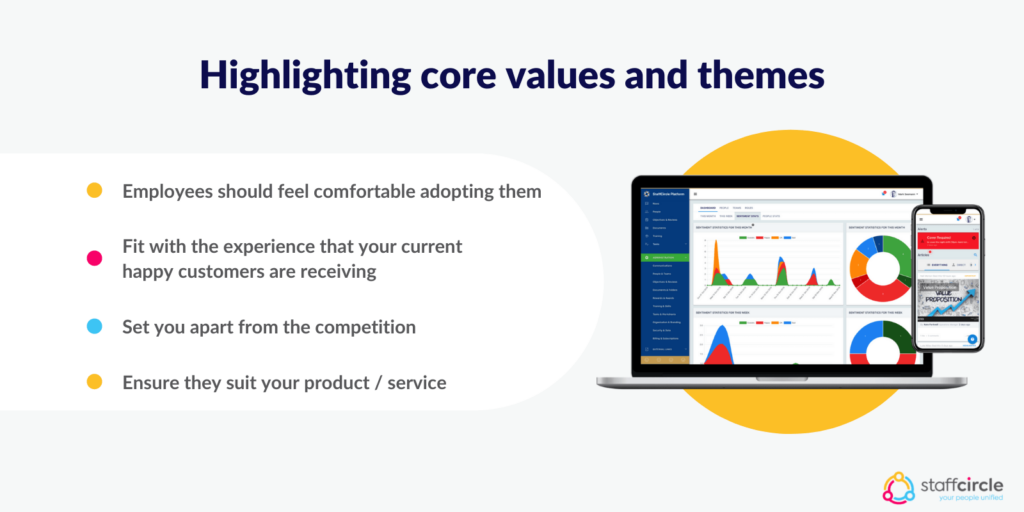
Doing this should enable you to highlight company core values that:
- Your employees will feel comfortable adopting
- Fit with the experience that your current happy customers are receiving
- Set you apart from the competition
- Suit your product/service
If you’d like to follow a step by step guide to building the best values for your brand, the Core Values Workbook by Coach Dawn Barclay is a resource available for download. It is split into four sections.
The first section requires you to ‘Reflect’ on the values you have come up with for your company, and consider if they truly represent an authentic identity.
The second section is aimed to ‘Explore’ i.e. align and live by the values. You may realise that you weren’t fully committed and that there are other values you want to incorporate in conducting your business. It is more important to refine your image based on what you truly believe in, and not just stick with values you’ve set out from the beginning because you feel tethered to them.
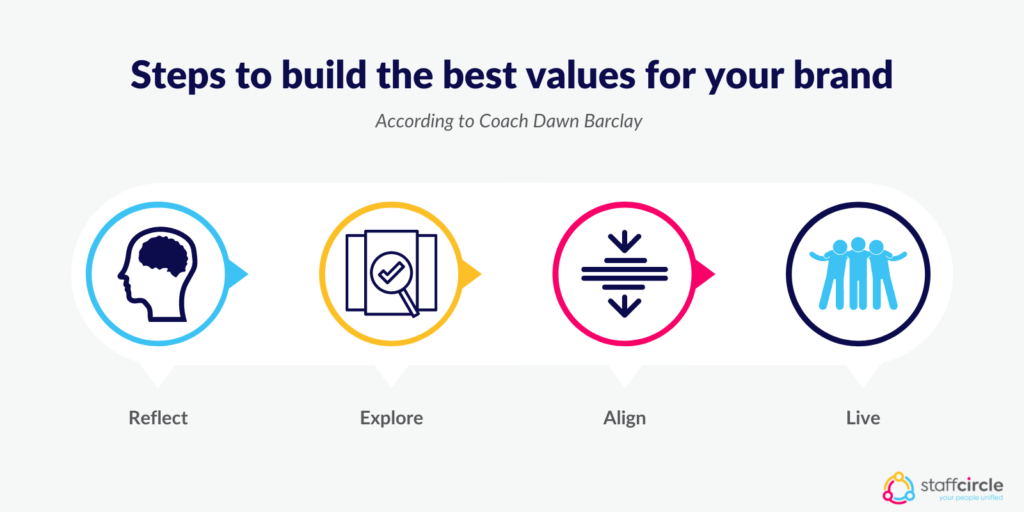
The third section is all about defining your brand value. Called ‘Align’, this section pushes you to take steps every day to point yourself in the direction of the values you’ve outlined. How are they expressed in the everyday? What can you do to improve this? You need to live your core values. It is one thing to introduce and ingrain them: another thing to live and conduct your business aligned with them.
This is why the fourth section is called ‘Live’. Simply live what you believe in. It can attract wonderful clients. Equally, it can determine a client base by defining incompatibilities between your values and theirs. If you value a culture of collaboration and involvement, it may not be a good fit when someone only wants a senior manager handling their project. Which is okay!
How can employees be involved in the process of creating and implementing company core values?
Workforces are more spread out than ever before. Non-desk employees, remote workers and independent contractors are widespread in today’s business environment. Communication, training and reinforcement of core values in-office is a challenge in itself, but when teams are scattered across multiple locations, the challenge grows even more daunting.
Be sure to find multiple platforms and methods to roll out research and communications about your core values project to ensure workforce engagement. You don’t need to get ALL your staff to provide their opinions, but asking for feedback from a wide cross-section of the business will be helpful.
OnStrategy’s guide highlights the need to get feedback and build core values around participants within the company. Involve your team by suggesting a strategy session to develop a list of shared values. The questions OnStrategy says are most important to ask are:
- What are three to five core values and beliefs that guide our daily interactions as a team?
- What are our non-negotiables?
Then, as a group, discuss the responses, and craft an explanation of the values that come up the most. Evaluate them, and gauge how important each one is for employees.
Once you’ve decided on initial core value ideas, we recommend testing them with other happy customers and with your workforce. Again, it helps here to have an employee communications tool in place to capture and analyse feedback quickly. Assuming the values pass the test, then it’s time to put them into action.
How can you ensure that your company’s core values remain relevant over time?
To ensure your values remain relevant as your business grows, re-evaluating what you stand for periodically is vital. Instilling your guiding principles within your organisation can take time, so it’s probably not wise to revisit them every six months. This could become confusing, or conflicting, for both your team and your customers.
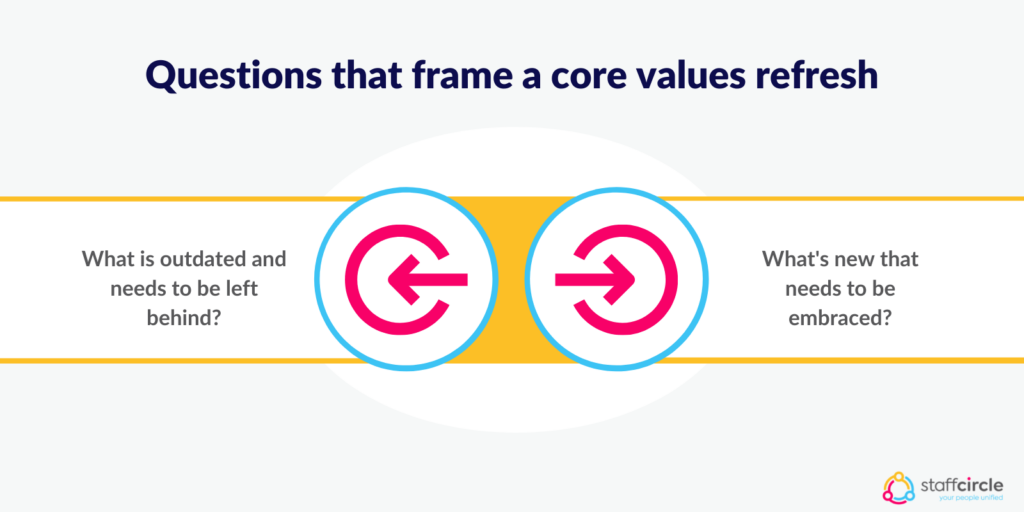
Taking the time to review your core values every couple of years, or after each significant growth stage, is the best approach. An article by Harvard Business Review suggests framing a value refresh with two simple questions:
- What is outdated and needs to be left behind?
- What’s new that needs to be embraced?
How to reinforce your company’s core values
Implementing and explaining your company culture is one thing, but it’s important to understand how to embed these behaviours in your employees. We’re experts at helping businesses create an irresistible employee culture, with success stories across the United Kingdom and beyond.
Check out our eBook, ‘Bringing Organisational Values to Life‘ to discover the steps you need to take to proactively evolve your business culture. The guide focuses on building these principles into the core of your business, whether you operate in-office, remotely or as a hybrid workforce.
It features an easy to follow process which enables HR leaders to turn their core principles into workforce behaviours. Real-world examples will demonstrate the value of understanding your corporate culture and investing in developing your brand value proposition.
If you’d like help to get started, we’ve even included four templates that you can use to develop a values-driven action plan for employee engagement.
Why is it important for employees to understand and buy into their company’s core values?
Recognising employee successes and celebrating those individuals who live and breathe your company’s mission statement will positively shape your organisation’s culture.
If they value and embody personability, then that should be something reflected in how you conduct your business. If you want all of your projects collaborated on by a number of people, teamwork could be a good value to instil in the newcomers and to sell to the clients. Your core values should be blossoming beliefs that every team member agrees with, embodies, and would want to see more of.
How to build a workforce that reflects your company value proposition
If your company is big enough, and if you want to stop cherry-picking every person who applies for a job with you (because, hopefully, so many will be), be specific in your interview approach. Alongside your standard competency-based interview, introduce a separate ‘culture interview’ with a relevant employee or member of your leadership team.
Ask questions that reflect your core values. For example, you could ask their views on ‘what makes good customer service or customer care’, ‘how to do the right thing in a difficult situation’ or ‘what employee satisfaction means to them’. You can even base the questions specifically around your core company values. For example, if one of your values is innovation, ask what their favourite gadget is and why it is unique from other products.
This tool from Workable gives examples of what questions to ask based on the values you have chosen to live by in your company. It is essential that whoever you onboard either reflects them in their personal values (and conducts business in the same way) or that they have the capacity to align with them and work towards a common goal. These employees are representing your company. Make sure that they do.
Help employees understand and embrace the company’s core values
When you decide on new company core values, that align with your feedback and research, you must roll this out to employees in the right way. Simply announcing your new company values once, then never mentioning them again, won’t help in your aim to develop employee engagement. You need to introduce your company values as part of your overarching business plan to guarantee employee engagement.
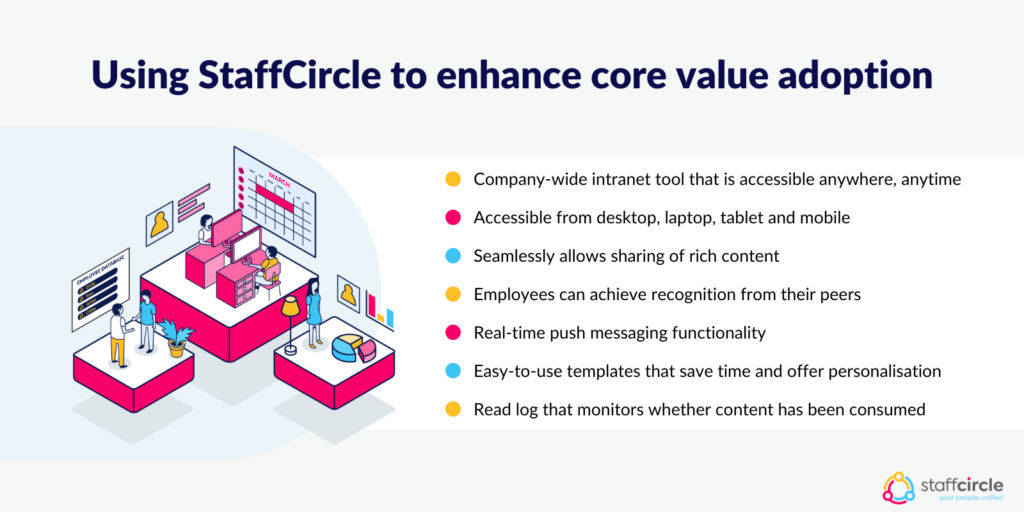
A great way to help every employee engage with each guiding principle you choose is by using technology. Choosing the right communications tool can support the rollout, reinforcement and measurement of work toward your core values. StaffCircle offers a deeply powerful yet easy-to-use software tool that can help you succeed at your core value initiative in a variety of ways, including:
- Creating a company-wide intranet tool that is accessible anywhere, anytime from desktop, laptop, tablet and mobile
- Seamlessly allowing for the sharing of rich content including video, image files and large files to keep each person on your team connected and your business looking professional
- A unified platform that allows your employees to share every success story and achieve recognition from their peers
- Real-time push messaging functionality to keep employee satisfaction high and work-related information fresh
- Easy-to-use templates that save time but offer deep personalisation
- Read log that helps monitor whether your content has been consumed
- And so much more
Summary
As your culture evolves, your company values should too. Don’t be afraid to check back in on them and consult the people in the company to get their take on it too. Continuous improvement is the key to growing a successful company, with innovation and integrity at its heart.
If there are any three things that you take away from this guide, remember:
- Values are integral to a company’s mission and purpose
- They must represent what the company stands for
- They must be realised in practice, in what the organisation actually does (and how each team member acts!)





